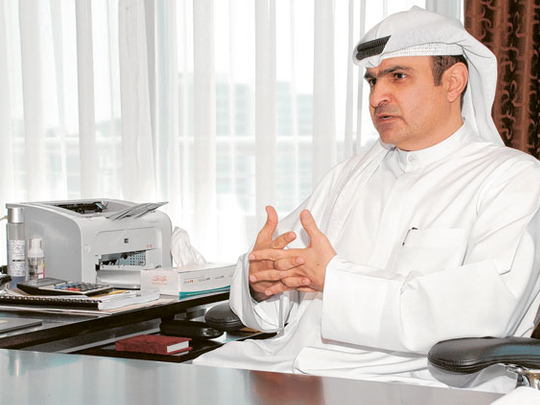
Dubai: The Department of Economic Development (DED) was established in March 1992 to organise, regulate and boost trade and industry in Dubai. In October 2008, the government tasked DED with ensuring that the objectives of the Dubai Strategic Plan were achieved.
The Government recently consolidated commercial laws and regulations and mandated DED to implement these laws in coordination with other departments.
In an interview with Gulf News Sami Al Qamzi, DED Director General, spoke about the current status of Dubai's economy and the implications of new legislation on the DED's role.
Gulf News: How is Dubai's economy performing in the aftermath of the global economic downturn?
Sami Al Qamzi: Unlike other leading business hubs of the world Dubai remained resilient and growing even during the global economic downturn. The emirate has sustained investor confidence and stimulated economic activity through increased public spending, infrastructure development, debt restructuring and a strong focus on traditional growth sectors such as logistics, trade and tourism.
Today, Dubai is firmly on the growth track, advancing through unprecedented infrastructure expansion and economic diversification. Non-oil sectors already contribute 98 per cent of Dubai's gross domestic product. The government of Dubai has allocated 43 per cent of its 2011 budget for developing infrastructure, including roads, transport, airports, civil aviation and tourism.
In 2010, Dubai registered 2.2 per cent GDP growth and going by current trends, Dubai is expected to grow 3.5 to 4 per cent this year.
International financial institutions, including the International Monetary Fund (IMF) and business analysts are predicting growth to reach 6 per cent in 2012.
How far has the 2020 Economic Strategic Plan devised by DED helped the economy to regain momentum?
As Dubai is one of the most globalised economies and an open economy, we have to remain flexible and accommodate global trends and developments. The 2020 Economic Strategy Plan (ESP) is part of our efforts to reposition the Dubai Strategic Plan 2015 in the new economic landscape. ESP outlines an innovative, non-inflationary and sustainable growth plan that will help achieve Dubai's social and economic agenda.
The impact of ESP is currently being felt across the economy and policymaking in Dubai. Institutions and their functions are being streamlined; business procedures simplified and new growth ecosystems are created for investors and entrepreneurs. These changes reflect in the rising trade volumes, improved foreign direct investment (FDI) inflows, increasing number of small and medium enterprises (SMEs), growing passenger arrivals and high hotel occupancy levels in Dubai.
DED has chalked out a comprehensive plan for Small and Medium Enterprises in Dubai. How far is the plan helping this important segment of the economy?
Small and medium enterprises are the backbone of Dubai's economy. Together they account for 95 per cent of the enterprise population, 42 per cent of the workforce and 40 per cent of the annual gross domestic product in Dubai. Our SME strategy focuses on enabling SMEs in Dubai to move to the next level of growth and compete at a global level, through better access to capital and enhanced equity participation of the public and private sector.
Earlier this year we launched the "Dubai SME 100," the first ranking initiative aimed to identify the top-performing SMEs in Dubai and enable them to become bigger, better and sustainable enterprises. The ranking will serve as a measure of SME success and [indicate] the ability of these enterprises to compete globally. Also, this year, we organised the first-ever Conference on Corporate Governance for SMEs and announced a landmark Code of Corporate Governance at the conference.
Through a recent initiative DED has set up a fund for supporting SMEs run by Emirati youth. How has the response from young Emirati entrepreneurs been?
The SME fund, recently approved by His Highness Shaikh Mohammad Bin Rashid Al Maktoum, Vice-President and Prime Minister of the UAE and Ruler of Dubai, will build on the competitive SME environment already existing in Dubai.
It aims to create a holistic entrepreneurial culture, through financial and intellectual support to young Emiratis.
The fund will provide young entrepreneurs with financing options, help nationals to get qualified and trained, and provide consultancy and research on business procedures and best practices. Emirati entrepreneurs in Dubai clearly understand the benefits they gain from the SME strategy of the Dubai government by way of new opportunities, capabilities and revenues.
When do you expect the economy to move to double-digit growth again?
A significant feature of growth in Dubai today is its stability. If we look at the present and projected growth, it is steady and draws on our strong economic fundamentals and traditional strengths. This kind of qualitative growth is the best guarantee for its sustainability and hence our focus is on maintaining the current growth pattern.
New law will help boost investment
Dubai: The Government has issued new legislation to consolidate commercial laws and regulations in Dubai. The DED will be implementing them in coordination with other departments.
Law No 13 of 2011 regulates economic activities and facilitates investment across various economic sectors. Under the new law, a single portal will be set up to help coordination between various government bodies.
The law also seeks to establish a unified record of licences and registry of businesses operating onshore and in the free zones, enabling both categories of businesses to interact effectively.
Registration
When requested by the free zone authorities, DED will permit them to use its software and electronic systems for business registration and licensing. DED also has the right to delegate any of its powers on licensing of facilities to any public or private agency.
The law also provides for allowing establishments in the free zones to operate outside these areas, based on agreement and coordination between DED and the free zone authorities. DED will also issue permits for promotional and marketing activities.












